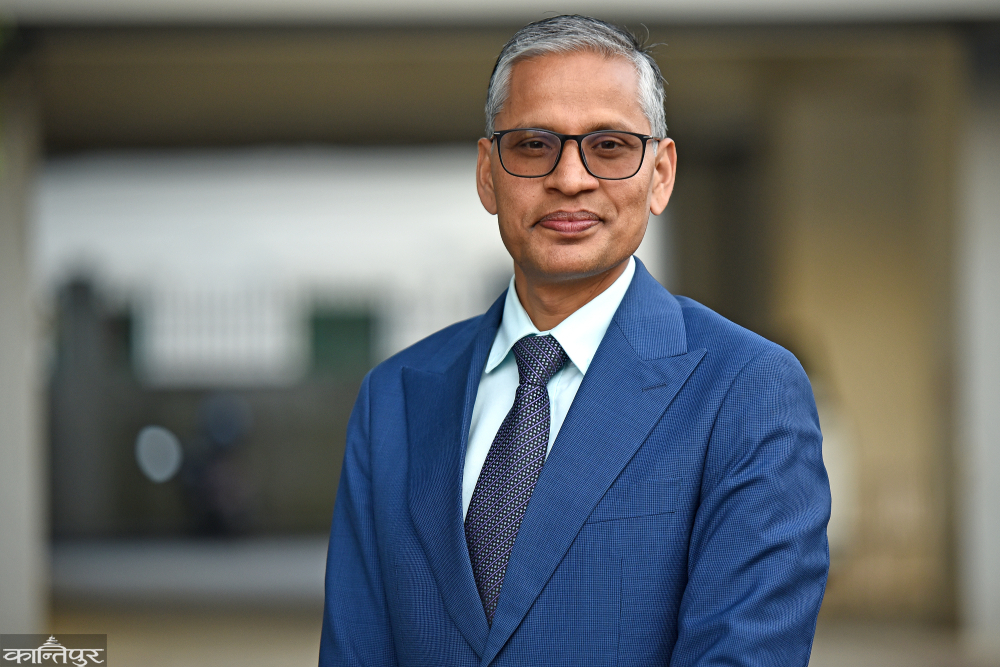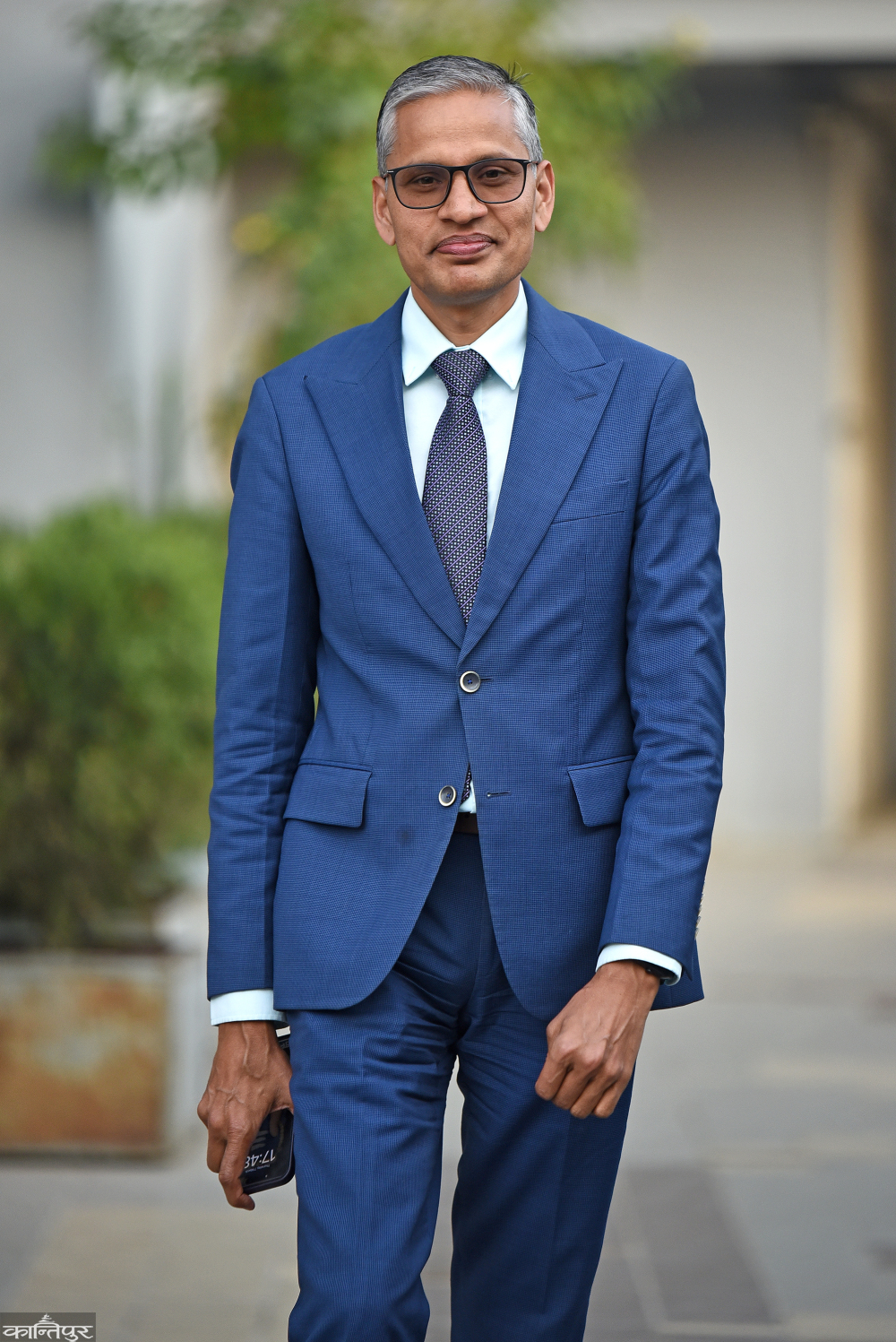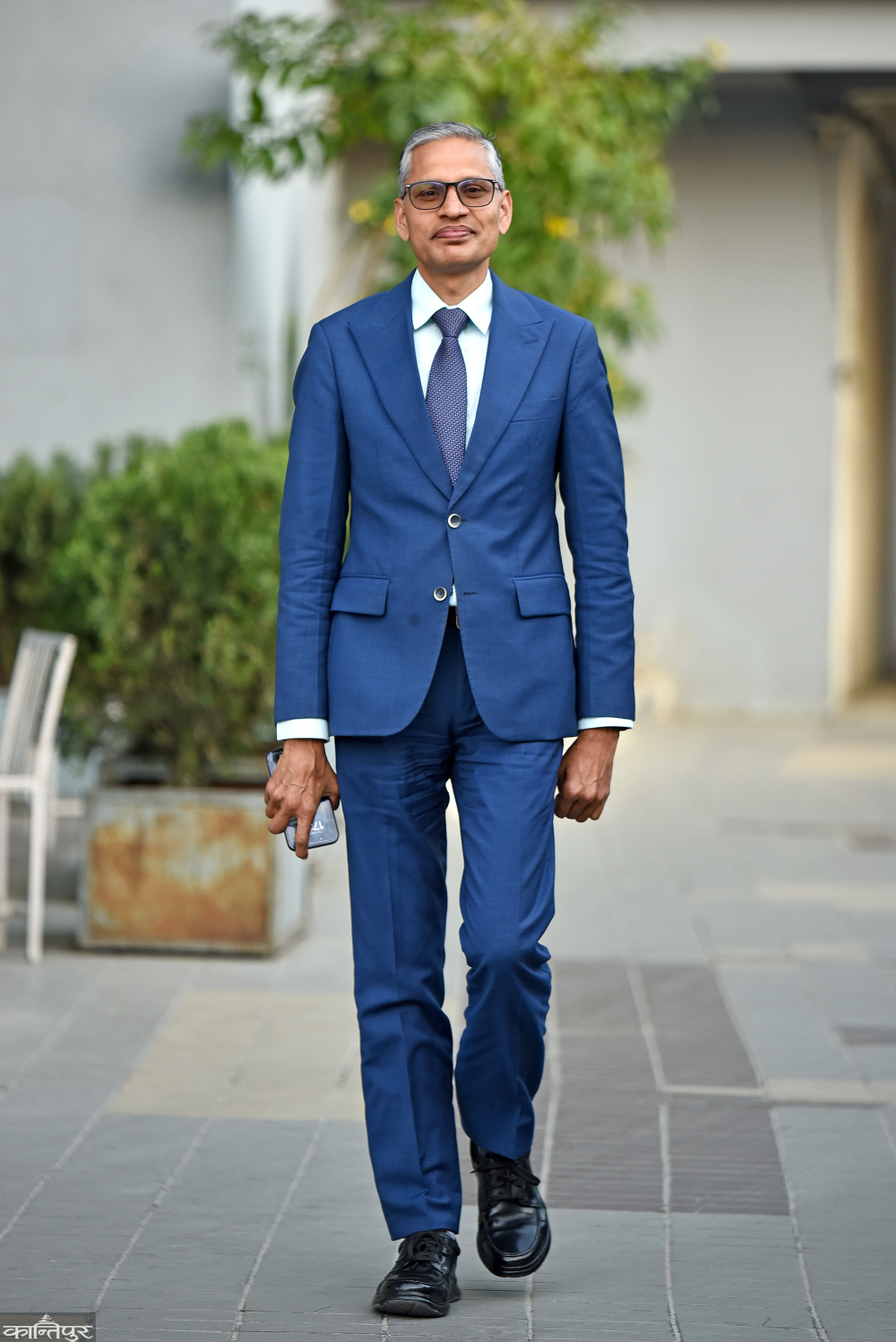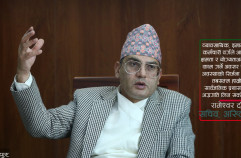Joint Secretary of Foreign Affairs at the age of 33 from another group
We use Google Cloud Translation Services. Google requires we provide the following disclaimer relating to use of this service:
This service may contain translations powered by Google. Google disclaims all warranties related to the translations, expressed or implied, including any warranties of accuracy, reliability, and any implied warranties of merchantability, fitness for a particular purpose, and noninfringement.


There is a verse in Sanskrit – Vidya Dhanam Sarva Dhanam Pradhanam. That is, Vidya is predominant in wealth. Because, it gives strength to the poor, leads the backward and gives voice to the speechless. As he gossips about the days he has spent and the detours he has taken, the tall Krishna Prasad Dhakal's two curious eyes are filled with this power of learning.



Currently, Dhakal, the head of the North-East Asia Division of the Ministry of Foreign Affairs, is "comparatively" busy as he has to deal with diplomacy with countries including China, Japan and Korea. Having started his career as a branch officer in the civil service 21 years ago, he is the only topper in the open competition for deputy secretary, who is among the rare 'career diplomats' who move to foreign affairs from other groups of services. His journey so far has been filled with incredible success. Dhakal, who climbed the ladder of public service, was the most advanced in the careers of Damal, in a way he was separated from his surroundings. And it was helped to overcome that by his passion for books.
Tapeshwar Mavi Tintak of Mandan-Deupur in Kavre was a proposed secondary school. If no one passes the entrance exam for three consecutive years, the proposed MA could be cancelled. In the third year 2051, Krishna Prasad was among those who took the entrance exam in large numbers. As for the results, Krishna Prasad was the only one to pass. "I was the only one and the first in the village to pass the SLC, that too in the first class," says Krishna Prasad, "I will never forget the joy I felt when I passed."
Even though his village was close to the capital, it was remote. Therefore, there was a lack of environment and people to inspire interest in reading. In such a situation, coming to Kathmandu for further studies was not a regular event in his life, but a fortuitous coincidence. While studying in Kathmandu, he also got a job in Saha Prakashan.
Some of his friends in college were from Syangjatir, who were preparing for Public Service Commission day and night. One of them suggested Dhakal to do the same. He suggested that the name will come out if you try. Needless to say, within the year of completing BBS, he cleared the branch officer exam and got into the civil services. "I am indebted to him for this," Dhakal said, "There was no one I knew or heard of who gave us a public service commission." Therefore, thousands of applications were required for a single post in the civil service and drawing a name was like winning a very large lottery. In the year that Krishna Prasad conducted the examination, 21,000 competitors participated for the 77 branch officers of the general administration of the civil service. In the last selection of that
 Krishna Prasad was not happy when he saw his name. After being authorized, the Nepal Administrative Training Institute used to provide basic administrative training for 90 days. Dhakal won the gold medal by topping it. It was a strong start to his working life.
Krishna Prasad was not happy when he saw his name. After being authorized, the Nepal Administrative Training Institute used to provide basic administrative training for 90 days. Dhakal won the gold medal by topping it. It was a strong start to his working life.
The eighth year of working as a branch officer i.e. 2067 was memorable for Krishna Prasad. 8 different exams advertised by Public Service Commission – Joint Secretary Administrative Services (Open), Under Secretary General Administration Group (Internal and Open), Under Secretary Revenue Group (Internal and Open), Under Secretary Accounts Group (Internal and Open) and Under Secretary Foreign Services (Open) ) and his name appeared in all the written tests.
It was a record in the history of Public Service Commission that eight high-level exams were passed at the same time, that too in different services (administration, accounting, revenue and foreign affairs). At that time, if his name appeared in the interview of the Joint Secretary to the Administration, the record of reaching that post at the age of 31 after fighting for public service would have been in his name. Although he failed in that, two years later, in 2069, he was selected through an open competition for the post of Joint Secretary of the Foreign Service. At the age of 33, he was the first person to become the Joint Secretary of the Foreign Service.
In this way, Dhakal's diplomatic career began at the age of 35, having spent time as an officer and deputy secretary from the General Administration Service Group in the Secretariat of the National Planning Commission, the Ministry of Industry, Commerce and Supply. It was the same passion that drove Dhakal, who was declared the topper among more than a hundred competitors who participated in the advertisement for the post of joint secretary.
It is rare to have a direct associate secretary in foreign affairs from outside the service. 12 years before that, Arjun Bahadur Thapa came from other services as Joint Secretary in Foreign Affairs, who later became Secretary of Foreign Affairs and Secretary General of SAARC. Even after 11 years have passed since Dhakal entered foreign affairs in Adhavainse Jowan holding Thapa's point, no one from other groups has entered there. "In that sense, this is a rare result," says Dhakal, "I am very happy to have such a rare coincidence." They are – study, observation, interaction and reflection. 'I used these four methods equally,' he says, 'the source material and topic of study are mostly the same but observation and reflection bring a new edge to the understanding and lead to the depth of the subject.' He is a supporter of the theory that if you read it with the thought that it will be wasted, it will create pressure - the taste of emphasizing the journey rather than the destination is different. "As you read, new horizons of knowledge expand, and you get more fun," Krishna Prasad suggests for young people who are preparing for public service. And even though he adopted such a strategy to avoid disappointment, the days of preparation were so difficult, when he tried to cook in the middle of the night when he was very hungry after studying hard in the dera, sometimes he would run out of rice and vegetables and sometimes he would find that the stove ran out of kerosene. How many nights he spent eating chips and biscuits because of the inconvenience of not being able to buy them at night. He also had to face the inevitable fate of an ordinary citizen who gives time for food, sleep, rest and other pleasant things and gives up his studies and when he insists on studies, many aspects of practical life are lost. And also, he tried to find a balance between study and rest as much as possible. And, he considered this surprise as a part of preparation and saved himself from disappointment.
 Nayraj Pant said somewhere that 'one should study 13-14 hours a day' as if it was echoing in his ears. Krishnaprasad thinks that even a stone breaks after being crushed, but the taste of Gnanaras that comes after sipping is amazing. Exams scare many people. However, Krishna Prasad says that this day should be considered as a celebration. "This is a ladder that takes us up," he said about the exam, "Isn't this the exam that gives us the title from nursery to PhD?" So, I treat exam day as a celebration and skip studying from the night before, to freshen up the mood.'
Nayraj Pant said somewhere that 'one should study 13-14 hours a day' as if it was echoing in his ears. Krishnaprasad thinks that even a stone breaks after being crushed, but the taste of Gnanaras that comes after sipping is amazing. Exams scare many people. However, Krishna Prasad says that this day should be considered as a celebration. "This is a ladder that takes us up," he said about the exam, "Isn't this the exam that gives us the title from nursery to PhD?" So, I treat exam day as a celebration and skip studying from the night before, to freshen up the mood.'
Public service toppers have a similar pattern of time management. That is, allocate equal time for each point. For example, writing a 100 marks exam in 3 hours will take 1.8 minutes for 1 mark and 18 minutes for 10 marks. "There can be a maximum of 2 minutes in this," Dhakal's experience says, "it should never be more than that." He thinks that the part of those who sit for the exam, "let's see if we give it like this" is often a problem. "Success can only be achieved through well-thought-out, well-planned and dedicated efforts," he says, "The Public Service Commission exam is actually a test of your commitment and dedication." The difference is, some help is direct and some is indirect. Krishna Prasad also has the invisible support of many in this success. As such, he learned many new things from the articles, compositions and books of many authors. 'How many notes did I get, met with many scholars and inquired,' he says, 'how many created an environment for reading, even read together with some.' The next year after his entry, he reached New Delhi and stayed there for three years as the Deputy Head of Mission and worked as Acting Ambassador for more than two years. He was in Delhi when the devastating earthquake struck. He got a rare opportunity to coordinate between the two countries for the assistance provided by the Indian government to Nepal.
Burj Khalifa, the tallest building in the world, is also the world's largest digital display, where people from all over the world come to promote their products or ideas. The flag of Nepal was hoisted on the digital wall of that tall building which is visited by thousands of people daily. It was Krishna Prasad who had arranged for the flag to be hoisted free of charge at the cost of lakhs of rupees.
It wasn't long before he went there as ambassador. When thinking about the diplomatic way to celebrate the Constitution Day in the country where he lives in public information, he thought of hoisting the flag on the Burj Khalifa. And, Krishna Prasad made a diplomatic coup in the Ministry of Foreign Affairs there. And, that evening, the moon and sun flag was also hoisted in the eyes of thousands of tourists who went to see the Burj Khalifa. Although it may seem small when you see the
 , such a cultural way of introducing the country abroad is an established move in diplomacy, which he put into practice with full vigor in the enthusiasm of his first time as an ambassador. "Thousands of people watched that scene live that evening, millions of people watched it through social media and mass media," smiles Krishna Prasad, "Nepalese who watched there felt their heads held high."
, such a cultural way of introducing the country abroad is an established move in diplomacy, which he put into practice with full vigor in the enthusiasm of his first time as an ambassador. "Thousands of people watched that scene live that evening, millions of people watched it through social media and mass media," smiles Krishna Prasad, "Nepalese who watched there felt their heads held high."
He was in the UAE. Many Nepalis were stranded due to the global outbreak of Corona virus. He had to lead the government work to return him to Nepal as an ambassador. His eyes sparkle with happiness when he remembers that he led the rescue of more than 35,000 people who were waiting abroad in a chartered flight.
Seeing government service as an opportunity, responsibility and challenge at the same time, he feels that working for the state is a reward in itself. On the one hand, there is the pride of success and the pressure of challenge, on the other hand there is a 'realism of the falsity of life' that will die one day, which prevents him from panicking. 'Life is not just a blind horse running after position, prestige and money,' he says, who is interested in philosophy, 'it is a game that does not get anywhere by running, rather it is a game that is enjoyed while running.' There was no lack of knowledge about the burdensomeness of service delivery. He also knows people's frustration towards bureaucracy. Therefore, he feels that holding public officials accountable for results is the biggest challenge of bureaucracy. This challenge is always on his part as well. "Nepali society is trying to move forward slowly by changing the old values, economy, structure and culture," his analysis based on his experience says, "However, the new values, economy, structure and culture have not taken a solid shape. In this sense, we are in transition in every dimension.
 At such a time, he thinks that the state should show the society a dream and guide everyone to achieve that dream. He believes that one part of the state is the government and another part of the government is the bureaucracy, which can do a lot if given clear vision and firm guidance with good leadership. "There is no shortage of qualified and honest people in our civil service," he says, "I don't think justice will be done to those honest employees just by raising the pictures of some corrupt people."
At such a time, he thinks that the state should show the society a dream and guide everyone to achieve that dream. He believes that one part of the state is the government and another part of the government is the bureaucracy, which can do a lot if given clear vision and firm guidance with good leadership. "There is no shortage of qualified and honest people in our civil service," he says, "I don't think justice will be done to those honest employees just by raising the pictures of some corrupt people."


 १९.१२°C काठमाडौं
१९.१२°C काठमाडौं
















